Mr. Schnabel, when does a work of art become important in your opinion? Do you need external confirmation, or is it something explicitly personal?
I don’t think something is important just because an audience likes it. Most people make art and movies as a job and if a lot of people go to see it they make money and that is their sign of success. I am not making judgment here, but their goal is strictly business-oriented. I don’t do this as a business.
So commercial success doesn’t interest you?
Do I think it’s good if people like it? I have to like it. If I think that something is good, it is fine. I mean Gladiator came out when my movie Before Night Falls came out. Gladiator won the Acadamy Award, Russell Crowe won the Acadamy Award. Would I rather be Ridley Scott? No. Do I think Javier Bardem’s performance was better than Russell Crowe’s, although Russell is an excellent actor? Yes. Javier Bardem’s performance was better. Did we win the Oscar? No. Does it matter? No. I mean he was the first Spanish actor to ever be nominated for an Academy Award. What does that say about the Academy? There is a level of chauvinism over there; it’s a club.
Do you think your indifference to the system has actually made you more successful?
Well I can’t just say yes to that, because then I would sound like the guy everybody says I am supposed to be: the arrogant, self-satisfied Schnabel. (Laughs)
But what you can admit is that you made quite an interesting transition from acclaimed artist to successful filmmaker. How did that come about?
I thought: If I feel like I should do it, I should do it. I shouldn’t worry that the art world is going to say, “Oh, Schnabel thinks that we’re not good enough for him, he is going to make movies now. The art world is not big enough, he’s going to make movies.” Then when the people liked the movies they said, “Oh, now he is a better movie director than a painter.” But that’s not really true. I happened to do it just the same way as some artists write letters. Van Gogh wrote letters and so we have a book of his letters to Theo. It is a great thing to have. The guy is a painter but he happened to write good letters also.
Are you interested in bringing the film and the art world a bit closer together? During the 2010 Toronto Film Festival you premiered with the exhibition Julian Schnabel: Art and Film which seemed to aim at that.
Maybe it should have just been called Paintings That Have Something To Do With Film. I think the idea was that maybe people from the film world would go and see the museum and it would bring these worlds together. I don’t care if those worlds are together or not. My attitude toward it is similar to the way Joseph Beuys left the Kunstakademie open so anyone who wanted to come, anyone who was interested in art, could come. Whatever brings somebody in so they can have an art experience is a healthy thing.
Do you prefer filmmaking or painting more?
I prefer to paint; I don’t have to translate anything. I don’t have to know if it is good or bad while I am working. I don’t want to think when I am working. Even if I am making a movie, I get to a point where I throw the script away. I know what I want people to do and ultimately it is a spontaneous kind of activity. They need to be able to feel comfortable enough to trust me so they can do something and know I won’t let them get hurt. They end up feeling that way and that is why the movies are good. But I prefer to paint.
Unlike painting, movie making is extremely collaborative. Do you have to fight to get your way sometimes?
I am my biggest critic. I have final cut on my films and I don’t care how much money they ultimately make. If I would have made The Diving Bell and the Butterfly in English, it would have made more money. But it wouldn’t be the movie that I wanted to make and I think the other people in charge had to swallow that when I told them about my intent to make a French movie. The guy is French and I am not going to have French people watching American people making believe they are French in France and then they are reading French subtitles.
We knew you were a talented filmmaker and painter, but we didn’t know about your photographic skills until you recently toured the world with a Polaroid exhibition.
First of all, I didn’t intend to be a photographer and I didn’t intend to be a movie director. I am not a photographer, but I took photographs. And the photographs that I took are very physical; they are like paintings in a way.
Why did you start taking pictures in the first place?
Because I was dissatisfied with how my work looked when it was photographed by other people. I wanted to show the way paintings look inside places where I am working. So I was taking these pictures over the past eight years and I didn’t have any intention to show them and this woman came and looked at them and said: do you think we can show those photographs? So to cut it short: was Stanley Kubrick a photographer? No. He was a movie director. But he took photographs that are a gift to see.
Are you in a way proud of all these different careers?
I don’t have a career as a photographer and I don’t want a career as a movie director, and I don’t have a career as a painter.
You don’t have a career?
No, I never thought of art as a career. I thought it was more like a monastic practice. It is something that you do – you can’t not do it. If I made money doing it, I would do it; if I didn’t make any money, I would do it.
Could you live without art?
If I never made another movie, I probably could live okay. I made the movies that I made, I think I did a good job, but if I couldn’t paint, I don’t know what I would do. If I couldn’t paint, I think I would be a problem. I would definitely be a problem to the people who have to put up with me, live with me, deal with me. I wouldn’t know what to do with myself. I would go surfing I guess and live in the jungle or something like that. You know, obviously I’m not perfect but the thing I am best at is painting.
Return to Top

Short Profile
Name: Julian Schnabel
DOB: 26 October 1951
Place of Birth: Brooklyn, New York, USA
Occupation: Artist, Director
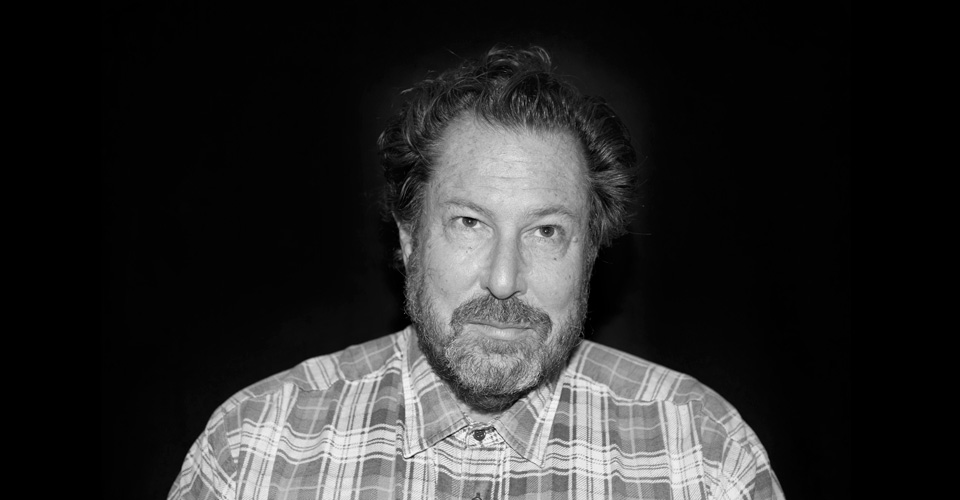
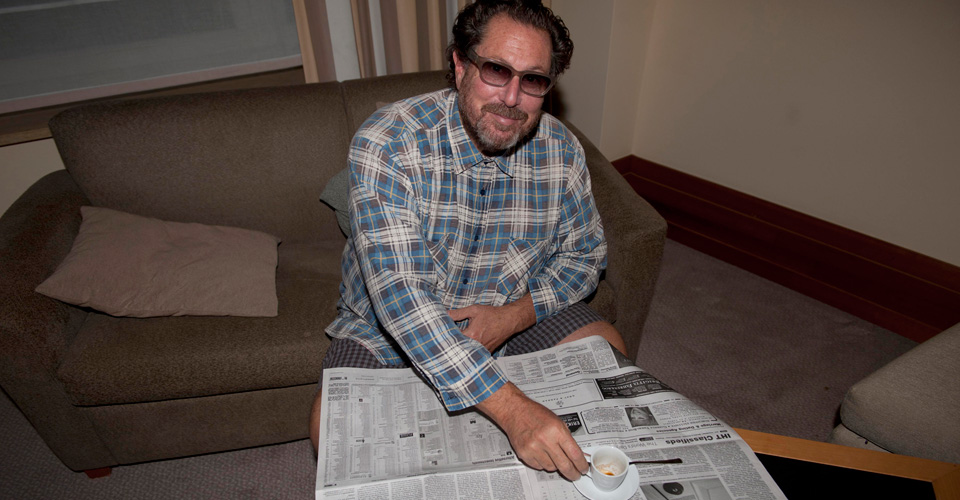
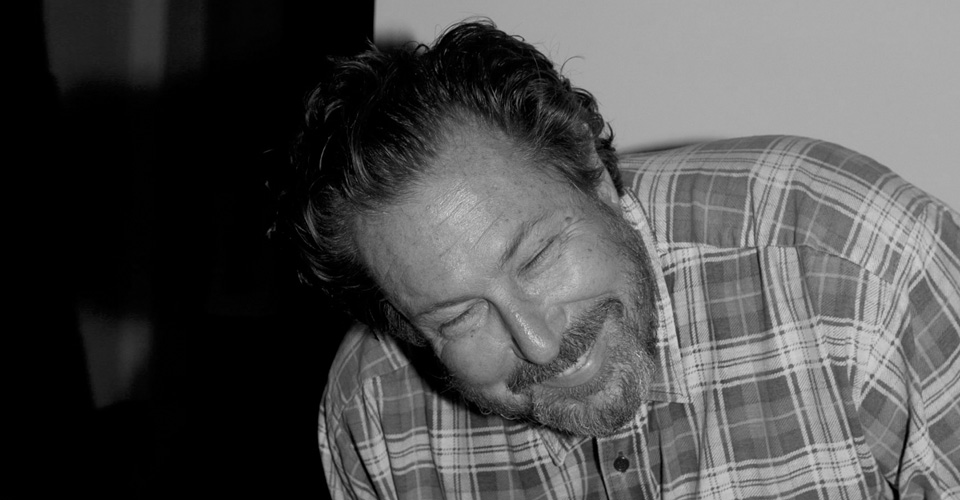
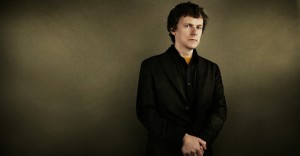
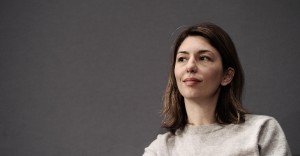
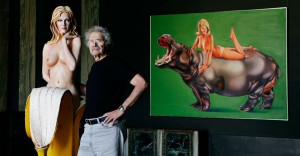

















Comparing Himself to Van Gogh? To Kubrick? To Beuys? This guy is well aware of all the things people say he is because he also believes all the things they say he is. He is a self satisfied arrogant bastard. And a shitty painter if I may say so myself. Or like Basquiat said “plates?…” “Ha…Ha…Ha…”
I dont think he compared himself to them, like saying he is as good as they were. He only said they did different things, like he does.
I have heard Schnabel talk to art students and I actually quite liked his approach. It sounds better when he speaks because he mocks himself in his tone that is hard to capture in print. His advice to students not to obsess about success was well received and appropriate. I don’t think he is comparing himself to Van Gogh: merely saying VG wrote well too. His painting is not quite my stuff, and I haven’t seen his movies or photos, but I still liked the exhibition associated with his talk: good fun and interesting.
The plates “paintings” . . . well . . . will anyone care in 20 years? But The Diving Bell and the Butterfly is a truly luminous work and before Night Falls is VERY VERY good. The man is clearly VERY skilled visually and I have no reason to think making a movie is easy, so, I can call him a brilliant filmmaker. What he says about art needing to be authentic for the artist (and only for the artist) is entirely true. Van Gogh was NOT sustained by his sales record. One works “for the muse” not the Public. If they applaud, how nice, But not essential.
Julian: stick to movies, where you have an entire cast and crew to help make them good. When it’s just you and the paintbrush… WOOF.
I like his movies. Before Night Falls and Diving Bell are beautiful movies and are produced by an artist with a heart. and I like his words also—–and arrogance is not an asset or a detraction—-it just is there in most people.
I remember reading a critique lauding JS for his “breakthrough” using broken plates and antlers and thinking what a crock.
However, 2 lovely movies and dozens of thought provoking paintings later I am impressed and in awe and wish him many more years with brush in hand. He’s one of the few painters left standing.
I feel like Julian Schnabel is the real deal. I, too, am a visual artist and film maker; so to an extent I can relate to his reasoning. He is passionate about art and the representation of his feelings behind the art work he produces. Success is in the eye of the beholder but I feel like he is also a bit conflicted as to the connection between commercial success and personal satisfaction with your life’s work…After all, he uses pretty big name actors…but I wouldn’t be surprised if he uses paint brushes from the dollar store…Interesting person, I’ve loved everything that I’ve seen him do thus far. Mr. JS is genuine and authentic in my book.
I don’t think he is self satisfied. I see a man content in his practise which allows him to validate himself and his existence – confidence in his abillity leads to confidence within himself. And he’s not comparing, he’s giving the best examples available.
“Creativity takes courage “said Henri Matisse and Schnabel certainly had a lot presenting his glued broken dishes at the Arco fair in Madrid in the eighties. Few years ago I saw one of his paintings at The Marlborough gallery in Madrid again, and the truth is that “ me dejo en blanco” meaning that I don’t recall one single line of it.. I don´t know what he´s doing now.
Since we are reading about Julian Schnabel the well known Painter and Film Director- let’s assume there is an audience out there that has a brief- simplified understanding of both films and art. Had he said that “ed s is a good painter and I like his letters too” I’m sure it couldn’t be taken as being an egoist. He simply could have avoided the interviewers questions and played dumb like andy warhol, but that would have been an asshole move- and not very honest either. Sometimes I like Bob Dylan’s old interviews when he treats the interviewer like an asshole, it just seems like something I would have done- but that doesn’t mean I’m comparing myself to Bob Dylan. The Gate maker, the lyricist, the song writer and the painter. please give me a break with all your skids and stops from the pop wheelies in the comment board. Your opinion shows how arrogant and self important you think you are.
You are a great atist Schnabeeel, because you feel free. I admire you, may be we meet sometimw and have a good talk
Great director. Great painter. Haven’t seen his photographs, but I suspect they’re pretty good.
He should however know that Kubrick was an accomplished photographer before he was a director.
A Kubrick quote that applies here “It’s much more important to be interesting than it is to be talented”.
Believing in his work and his reasons for doing it doesn’t make him arrogant. From the way he describes his process, it’s clear he’s (by the time he’s really into it) going by intuition. That is not of the ego. That is not being self-satisfied. That is having faith in something beyond ego. Improvising involves relinquishing control; submitting, in a way; this is finding release from the ego, not acting out of it. It’s the opposite of arrogance.